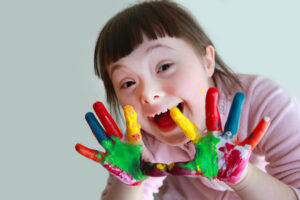Posts Tagged ‘Inclusivity’
Discover Down Syndrome: Understanding, Characteristics, and Early Intervention
Down Syndrome, known as Trisomy 21, represents a significant aspect of human diversity, reminding us of the intrinsic value and potential within each individual, regardless of genetic differences. This condition, resulting from an extra copy of chromosome 21, is the most commonly diagnosed chromosomal condition in the United States, affecting approximately 1 in every 700…
Read MoreThe Transformative Power of Creative Arts Therapy
Creative Arts Therapy emerges as a crucial intervention in today’s stress-filled world, providing a unique blend of artistic expression and psychological care to foster emotional well-being. This form of psychotherapy leverages various art forms—including music, dance, drama, writing, and visual arts—to enable non-verbal expression, allowing individuals to tap into deep psychological states within a supportive environment. It focuses not on the artistic outcome but on the therapeutic process of creation for healing and growth.
The therapy offers extensive benefits, such as facilitating emotional release, enhancing self-awareness and insight, reducing stress, improving cognitive function, and bolstering communication skills. Its inclusivity makes it beneficial for a wide range of individuals, including children, adolescents, adults, those with physical health issues, and people experiencing trauma.
Creative Arts Therapy can be practiced in diverse settings like private practices, hospitals, schools, community centers, and online platforms, ensuring accessibility for many. It stands as a powerful testament to the healing capacities of creativity, providing a holistic approach to wellness that nurtures the mind, body, and soul, and promotes a journey of self-discovery and healing through the universal language of the arts.
Read MoreSupport Groups for Caregivers with Children with Neurodiversity in Toronto
In Toronto, a city celebrated for its inclusivity and resilience, caregivers of children with neurodiversity find a strong network of support and community. Neurodiversity, recognizing neurological differences like Autism Spectrum Disorder (ASD), Attention Deficit Hyperactivity Disorder (ADHD), Dyslexia, and more as a natural part of human diversity, brings unique joys and challenges. Support groups in Toronto are vital, providing education, empowerment, and a connection for those caring for neurodiverse children, ensuring no one has to face this journey alone.
These groups, such as Autism Ontario’s Toronto Chapter, ADHD Parent Power Support Group, Toronto Dyslexia Network, and Holland Bloorview Kids Rehabilitation Hospital’s Family Support Programs, offer a range of services from information sessions and workshops to peer support and educational opportunities. They create safe spaces for sharing experiences, exchanging resources, and fostering mutual understanding and support.
Engagement in these support groups transforms the caregiving experience from isolation to community, offering belonging, validation, and comfort. Toronto’s diverse array of support groups provides not just resources and advice but also friendship, resilience, and strength, highlighting the importance of finding one’s community in navigating the path of raising a child with neurodiversity.
Read More


